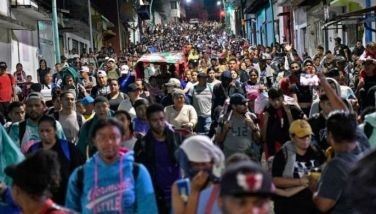South Africa's embattled president won't give key speech

FILE - In this Thursday, Feb. 9, 2017 file photo, South African President Jacob Zuma, front, gestures on his arrival at parliament in Cape Town, South Africa, for his State of the Nation address. The president has been enmeshed in a series of scandals but denies wrongdoing. Many members of the ruling African National Congress party have turned against him. (AP Photo/Nic Bothma, Pool)
JOHANNESBURG — South African President Jacob Zuma will not give the state of the nation address in parliament this week because of concerns that lawmakers would disrupt the speech, officials said yesterday, reflecting the weakened state of a leader under intense pressure to resign because of scandals.
The embarrassing decision to postpone Thursday's speech, a major event in which the president lays out a national agenda, added to the momentum against Zuma, an astute political operator who appeared to be running out of options after years of fending off allegations of wrongdoing.
"We have, regrettably, come to the conclusion that there is little likelihood of an uneventful joint sitting of parliament this coming Thursday," said parliamentary speaker Baleka Mbete, referring to the "disruption, anarchy and chaos" of past years in which opposition legislators heckled Zuma and were dragged out of the chamber by security guards.
Parliamentary officials met Zuma to propose that the speech be postponed to establish "a much more conducive political atmosphere in parliament" and learned he was already writing to parliament to suggest the same thing, Mbete said. The president's office confirmed that Zuma had requested a delay "due to certain developments" that would thwart a successful parliament session.
While parliamentary officials indicated that the speech might be delayed only by about a week, there were serious doubts about whether Zuma will deliver the address at a later stage. Opposition parties have said the president is so discredited that he has no right to address the nation, while many former loyalists in the ruling African National Congress party want him to quit so they can try to recover lost popularity ahead of 2019 elections.
A key ruling party committee planned to meet Wednesday to discuss the president's fate, amid reports that some members might push for ANC leaders to demand that Zuma resign. Other options for his removal include impeachment proceedings in parliament or a vote on an opposition-sponsored motion of no confidence that is scheduled for Feb. 22.
The ANC was the main anti-apartheid movement for decades and has led South Africa since the end of white minority rule in 1994, but its moral stature has diminished because of concerns about Zuma and wider problems of corruption and mismanagement. Waiting to replace Zuma is Deputy President Cyril Ramaphosa, who already has taken over from his boss as party leader and recently delivered strong anti-corruption messages.
Zuma met Cabinet ministers on yesterday and, a day earlier, visited Zulu King Goodwill Zwelithini in his home base of KwaZulu-Natal province, which has been a strong base of support for the president. Few details about the discussions were announced.
Scandals swirling around Zuma include multi-million-dollar upgrades to his private home with state money and his association with the Guptas, a business family accused of looting state enterprises and influencing Cabinet ministers for their own benefit. Zuma and the Guptas deny any wrongdoing, though the president paid back some money for the home upgrades after the Constitutional Court ruled against him.
Separately, Zuma's lawyers have submitted arguments to prosecutors about why he shouldn't be prosecuted for corruption charges tied to an arms deal two decades ago. The charges had been thrown out but a court reinstated them last year.
Zuma must go "sooner rather than later," though his departure would not be enough to address deep-rooted corruption in one of Africa's most developed countries, the Nelson Mandela Foundation said. The non-profit group promotes the legacy of South Africa's anti-apartheid leader and first black president.
The country's biggest opposition party, the Democratic Alliance, welcomed the postponement of the state of the nation address and said parliament should elect a new president next week. Party leader Mmusi Maimane said Zuma should be prosecuted for alleged corruption, amid speculation that the president might seek an immunity deal in exchange for his resignation.
"We flatly reject any amnesty agreement or special deal for Jacob Zuma," Maimane said.
- Latest
- Trending

































